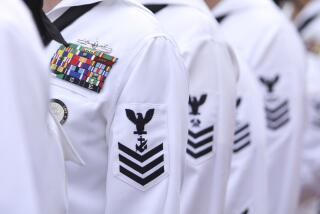These Naval Operations Are Cosmetic--and Free
- Share via
SAN DIEGO — Navy doctors are performing hundreds of free cosmetic surgeries at taxpayer expense on Navy personnel and their families--a benefit rarely provided by private health insurance and specifically prohibited by Veterans Administration hospitals.
In San Diego alone, 544 free cosmetic operations were performed during the past two years. From 1986 to 1989, Navy doctors nationwide performed more than 1,800 breast augmentations, face lifts, nose jobs, liposuctions and hair transplants--operations that usually cost thousands of dollars apiece.
Navy officials say these surgical procedures allow doctors to hone their skills and practice their craft in readiness for wartime.
But critics contend that taxpayers should not foot the bill for military personnel to fine-tune their faces and physiques, especially when the government is trying to reduce military spending. If the doctors need practice, they say, they could help out the many indigent people who need but cannot afford reconstructive surgery.
“It’s inappropriate to spend taxpayers’ dollars on medical operations that essentially are designed to allow people to be more stylish rather than to provide real substantive medical benefits,” said Rep. Duncan Hunter (R-Coronado). “The ability to do a tummy tuck or nose bob is of relatively little medical benefit to a surgeon who really does intend to spend time working on military-related cases and combat-related cases.”
If Navy doctors need practice, Hunter said, they should operate on wounded refugees from countries such as Afghanistan.
The surgery has been available to active-duty personnel, their spouses and children as well as retired members of the military at San Diego’s Naval Hospital and three other facilities across the nation.
Donna Baden, a San Diego Navy dental assistant, had her jaw surgically moved forward 6.5 millimeters. Still unhappy with her face, she underwent two nose jobs. Finally, in February, 39-year-old Baden, who joined the Navy five years ago, had her breasts enlarged. Soon after the last operation, Baden left the Navy.
All of Baden’s operations were performed at the Naval Hospital in Balboa Park free of charge, except for the breast implants Baden had to provide for the last surgery. Those cost $565, she said.
The nominal price was the main reason she had the work done, Baden said. “I’m really pleased with the results. This just did something for my self-esteem.
“These doctors in the Navy need experience like any other doctor,” she added. “They appreciate the experience of having people to work on.”
In San Diego, cosmetic surgeries represent 12% of all plastic surgeries performed; they also represent almost 6% of all surgeries performed by the hospital’s ophthalmologists and ear, nose and throat doctors, according to statistics obtained by The Times.
“The issue isn’t whether or not we should be doing cosmetic surgery; my position is how much is reasonable. I suggest that 6% is reasonable and 12% is appropriate,” said Rear Adm. Robert Halder, the commanding officer of the Navy Hospital, which has no plastic surgery residency program but does have three plastic surgeons.
The Air Force’s eight and the Army’s 22 plastic surgeons also do “aesthetic operations.” Air Force doctors performed more than 540 such operations in 1988 and more than 640 in 1989. Army doctors conducted more than 3,500 cosmetic surgeries at about 50 Army hospitals around the world in 1988.
“Why in the world is an Army doctor doing a nose job? Because it’s really critical for skills--an Army doctor can’t just sit there and do nothing for two years,” said Virginia Stephanakis, a spokeswoman for the U.S. Army surgeon general. “They really have to keep their skills up.”
In the civilian world, face lifts can cost as much as $6,000; hair replacements and tummy tucks usually go for no more than $5,000, breast augmentation for $2,500, according to the American Society of Plastic and Reconstructive Surgeons.
Critics say taxpayers should not have to pay for these surgeries, performed solely for vanity.
“I understand that the hospital and residents’ programs want to give young doctors experience, but it’s absolutely unconscionable that I am paying for it,” said Dr. Merrel Olesen, a plastic surgeon with the La Jolla Cosmetic Surgery Center.
Eleven plastic surgeons are assigned to Navy hospitals in Bethesda, Md., Portsmouth, Va., Oakland and San Diego. Three work in San Diego. In 1989, the most recent year for which national figures are available, doctors at the four facilities performed 173 breast augmentations, 217 face lifts, 187 liposuctions and one hair transplant.
To help facilitate the Navy Hospital’s fat-removing surgeries, the hospital bought two liposuction machines, which cost $3,200 each. One was purchased in 1988, the other in 1986, said Halder, who added that the hospital would have purchased the machines even if doctors did not perform cosmetic surgeries.
In about 98% of the operations, the liposuction machine is used for cosmetic procedures, said Cmdr. Scott Barttelbort, chief of the plastic surgery division at the Navy Hospital.
In San Diego, the plastic surgeons are deluged by about 100 requests monthly, mostly from women who desire bigger breasts, wrinkle-free faces and smaller noses--in that order, Barttelbort said. About 12% of the 1,138 plastic surgery procedures performed in two years beginning March, 1988, were performed for aesthetic reasons, said Halder.
Two other departments at the Navy Hospital--ophthalmology and the ear, nose, throat--also conduct some cosmetic surgeries. During the two years beginning in March, 1988, ophthalmologists performed 189 operations to reduce wrinkles around the eyes. In the same period, ear, nose and throat physicians performed 217 cosmetic surgeries, which make up about 5% of their total number of operations.
The Department of Veterans Affairs has issued regulations prohibiting such surgeries, which are considered elective and non-essential, spokesman Bob Stevens said.
More to Read
Sign up for Essential California
The most important California stories and recommendations in your inbox every morning.
You may occasionally receive promotional content from the Los Angeles Times.













